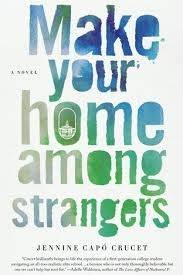I wonder if it’s universal to the experience of growing up that young people, away from home and on their own for the first time, feel simultaneously mortified by their families and comforted by them? Perhaps “universal” is too strong a term. Then again, part of the process of maturing usually includes wanting to break away from one’s background (whatever it may be) and find one’s own way. And, for some, “one’s own way” often includes circling back at least once.
 In Jennine Capó Crucet’s first novel, Make Your Home Among Strangers, this is central to the journey undertaken by Lizet Ramirez, a college freshman whose roots are in working-class Miami. Her parents, immigrants from Cuba, were surprised to discover that their daughter had been accepted to prestigious Rawlings College in New York – especially since they never knew she applied. But her impetuous act – or “betrayal,” in her parents’ words – is just the first of many situations in which Lizet is pulled in two directions. On the one hand, Lizet struggles with wanting more than the future offered by her substandard high school and modest surroundings, feeling like an outcast because she aspires to higher education and more plentiful options. On the other hand, at Rawlings, she is the minority student, the charity case struggling to fit in with students who have wealthy families and designer mittens.
In Jennine Capó Crucet’s first novel, Make Your Home Among Strangers, this is central to the journey undertaken by Lizet Ramirez, a college freshman whose roots are in working-class Miami. Her parents, immigrants from Cuba, were surprised to discover that their daughter had been accepted to prestigious Rawlings College in New York – especially since they never knew she applied. But her impetuous act – or “betrayal,” in her parents’ words – is just the first of many situations in which Lizet is pulled in two directions. On the one hand, Lizet struggles with wanting more than the future offered by her substandard high school and modest surroundings, feeling like an outcast because she aspires to higher education and more plentiful options. On the other hand, at Rawlings, she is the minority student, the charity case struggling to fit in with students who have wealthy families and designer mittens.
Lizet is a more-than-capable student, but the determination she displays is constantly undercut by her feelings of inadequacy. And whenever she returns home to Miami, she is so desperate to lose her “otherness” among her family that she immerses herself in the behavior that she finds at once distasteful and empowering.
All of this would be enough to handle, but things are compounded even further by a cultural and legal battle based on the uproar surrounding Elian Gonzalez circa 2000. Lizet finds herself tethered to this situation by her mother, who has developed a zealous attachment to a young Cuban refugee, his family, and his plight.
Is Lizet a sell-out? A fake? Does she deserve more? Does she even want more? In her mind, the answer to each of these questions is yes, and also no.
This is a thoroughly engrossing work, a story told with such honest language and characterization that it is exceedingly hard to put down. The supporting characters are rich and recognizable, even when they appear only briefly. Among these are Lizet’s parents, now divorced, as well as her older sister, Leidy, who never left the neighborhood and presumably never will. Their words and actions ring true, their stories and descriptions full of pride, humor, and heartbreak.
And then there is Lizet, who is one of the most frustrating protagonists I’ve ever encountered. She is smart and funny, tough and resourceful; and yet she is also impulsive and self-sabotaging. This is a combination that made me shake my head in disbelief more than once, and yet it is a compelling blend of wholly realistic tendencies.
Added to this is my own cultural self-consciousness as a reader. On the one hand, I felt myself relating to Lizet: I can remember being away at college for the first time, after all, as well as the conflicting sensations of spreading my wings and feeling totally overwhelmed. I can remember feeling unsophisticated and undereducated. I know what it’s like to feel like a fraud among my peers. But am I giving myself too much credit here? As a middle class white male who grew up relatively comfortably and with no tangible connection to my distant Irishness, just how much insight am I really bringing to my reading of Lizet’s struggle? And, even more troubling, am I frustrated by her choices at times because I think she’s not making the right decision or because I think she’s not making the White Decision? This is a question that occurred to me more than once as I read, hoping and praying that I did not fall into the same category as the Rawlings student who believes she understands Lizet’s experience because she once read The House On Mango Street. (Excellent criticism there, by the author, and sharpened to a lethal point.)
I wonder, should I feel like an outsider, eavesdropping on a conversation that doesn’t include me? Or, as a reader, should I feel invited? In the end, I have elected (in Lizet’s style) to feel both ways at once. As much as I might not identify with each and every one of Lizet’s cultural identity issues, I celebrate the book that can enlighten me to a culture that is not my own while making me question my motives and preconceptions.
Make Your Home Among Strangers is an excellent debut novel, lovingly crafted by Jennine Capó Crucet. I highly recommend it and hope that you will accept its invitation.
Catch Jennine reading at Krannert Center Studio Theatre at 9:30 p.m. on Friday, September 25th as part of Pygmalion LitFest, with Janaka Stucky and Marcus Wicker following. This event is free and open to the public.








